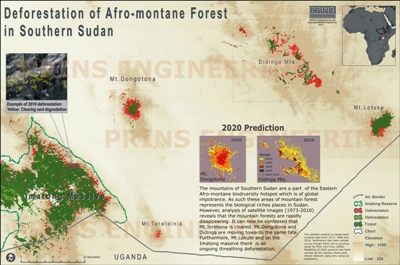South Sudan risks losing natural forests to illegal logging
March 17, 2016 (JUBA) – South Sudan has no forestry policy and its authorities are worried the world’s youngest nation could lose its natural forests, unless stringent measures are put in place to curb the rampant rates of illegal logging.

The report, the agency said, was based on scientific monitoring and investigations undertaken its team undertook in cooperation with local partners over the past months, which documented a sharp rise in illegal activities in various areas of the young nation.
Cited as an immediate threat to South Sudan’s forests were illegal logging, gold mining and charcoal production, among others.
Sadly, however, these illegal activities are reportedly being perpetrated by local and international individuals and actors, including members of various armed groups active in the country.
South Sudan is currently embroiled in a conflict that has killed tens of thousands of the population, displacing nearly two million of them.
According to conservationists, prior to the outbreak of its war in December 2013, South Sudan’s extensive areas of untouched natural woodlands, forests, and savannas, were home to wildlife populations including approximately 2,500 elephant, hundreds of giraffes, the endemic Nile Lechwe and white-eared kob tiang, Mongalla antelope migrations, wild dog as well as chimpanzees.
However, over the past two years of armed conflict, the various armed forces across the country, WCS said, have been implicated in several cases of large-scale illegal exploitation of natural resources.
“The situation of uncontrolled illegal logging, mining, poaching, charcoal trade, and other natural resource exploitation in the country is getting worse,” acknowledges Jaden Tongun Emilio, the chairman natural resource management group for South Sudan.
He calls for the enactment of a natural resource enforcenemt law.
“We need to work together at local, state, and national levels to ensure that the foundation for future development of the country is secured through sound and transparent natural resource law enforcement and integrated management,” stressed Tongun.
Despite concerns from conservationists and authorities, John Aguer considers forest logging and charcoal production as his livelihood.
The wood, which Aguer converts into charcoal and sometimes to build good shelter for his family, is his only means of making a living.
“I usually cut dry trees around the forest and I burn charcoal out of it,” the 35-yearl old tells the African Independent, through a translator.
He adds, “As for now, I consider this the only source of my survival.”
Although there is no information on the exact number of forests in the country, forests and woodlands, according to 2009 figures from the Agriculture and Forestry ministry, cover an estimated 29 percent of the land area in South Sudan or 191,667 square kilometres.
A 2010 study conducted by the United Nations Food and Agricultural Organization (FAO), estimated that a high rate of up to 2,776 square kilometres of forests and other wooded land were being lost annually in South Sudan.
PRINS Engineering, in a 2011 study, discovered that the forests of the Imatong Mountains, rising to 10,456 feet (3,187 meters) in southern South Sudan were part of the Eastern Afro-montane ecosystem, rated by scientists as one of Africa’s biodiversity hot spots.
These forests, it said, are homes to many endemic and possibly unique species, but scientists have yet to study the region’s species.
Policy makers, however, say de-forestation remains a threat to forests, but absence of a forestry policy in the country worsens it.
“It is illegal to cut down trees in the forest reserves,” Beda Machar, the Agriculture and Forestry minister told a recent symposium.
But in the absence of laws, he admitted, deforestation will continue to negatively impact on the country’s rain patterns and eco-system.
WCS’s conservationists also cited the expansion of unregulated charcoal production along, allegedly involving several members of the South Sudanese army (SPLA).
“Illegal logging has occurred in and around Southern National Park and Lantoto National Park (involving Ugandans in complicity with local South Sudanese) and further illegal logging has been reported in forest reserves in the Yambio area,” it further notes.
But while South Sudan makes progress towards fully implementing the peace accord signed in August 2015, there is an urgent need for the Transitional Government of National Unity, State, and local stakeholders and international partners to work together to halt this exploitation crisis, secure the natural resource base for the future development of the country, and prevent further conflict, says WCS.
“The country is highly vulnerable to slipping into a situation in which various individuals and groups take advantage of the governance vacuum to engage in illegal and unsustainable activities plundering and destroying the natural resource base,” conservationists warned.
“This risks exacerbating corruption, armed and political conflict, and undermining future development, and stability in the country”.
Edmund Yakani, an activist, called or full implementation of all wildlife, forestry, mining and the environmental laws of South Sudan.
“Sustainable peace and development will only become a reality if the nation’s natural assets are secured, conserved and sustainably utilised for the development of the country and its citizens,” he said.
The country’s Imatong forests, experts say, have been heavily degraded and deforested, and Mount Dongotomea is now bearing the brunt of clearing that threatens to fragment the ecosystem further. The mountain’s tree cover has reportedly been reduced by two-thirds since 1986, and, if deforestation in the area continues, the natural forests of will also disappear before the end of the decade.
However, as many people get involved in commercial agriculture, deforestation practices may be hard to control given the growing interest of foreign entities in South Sudan’s large spans of land.
With more than a third of its population moderately or severely food insecure, South Sudan is among the most food insecure countries in Sub-Saharan Africa. FAO and World Food Program estimate that a significant proportion of the nation’s population, as high as 33% in the lean season, depends on food aid to ensure a minimum level of nutritional intake.
(ST)
